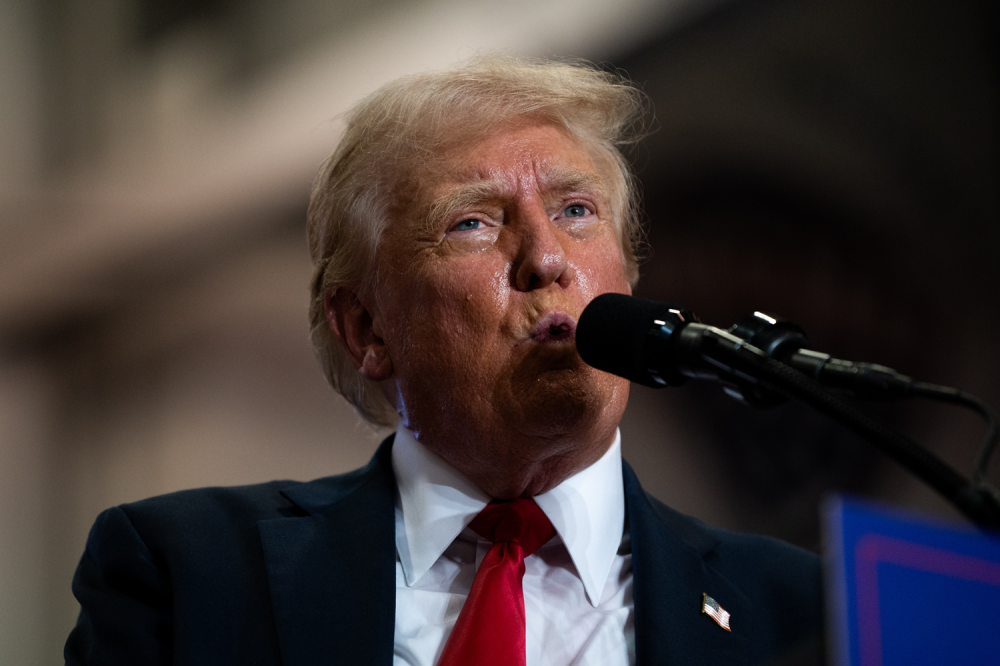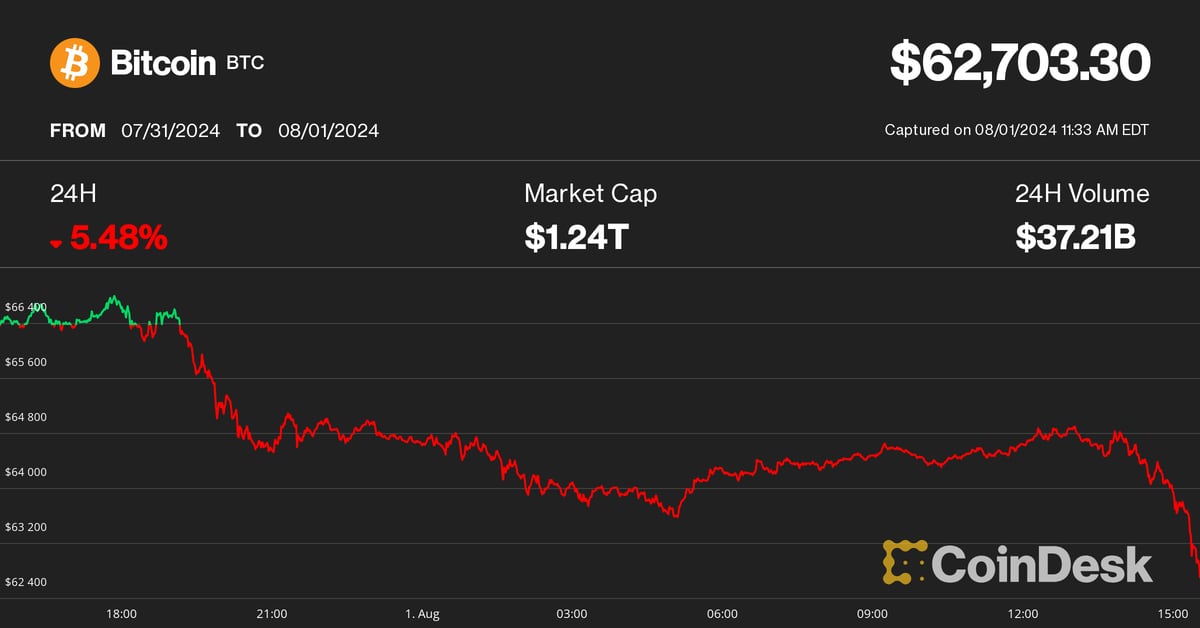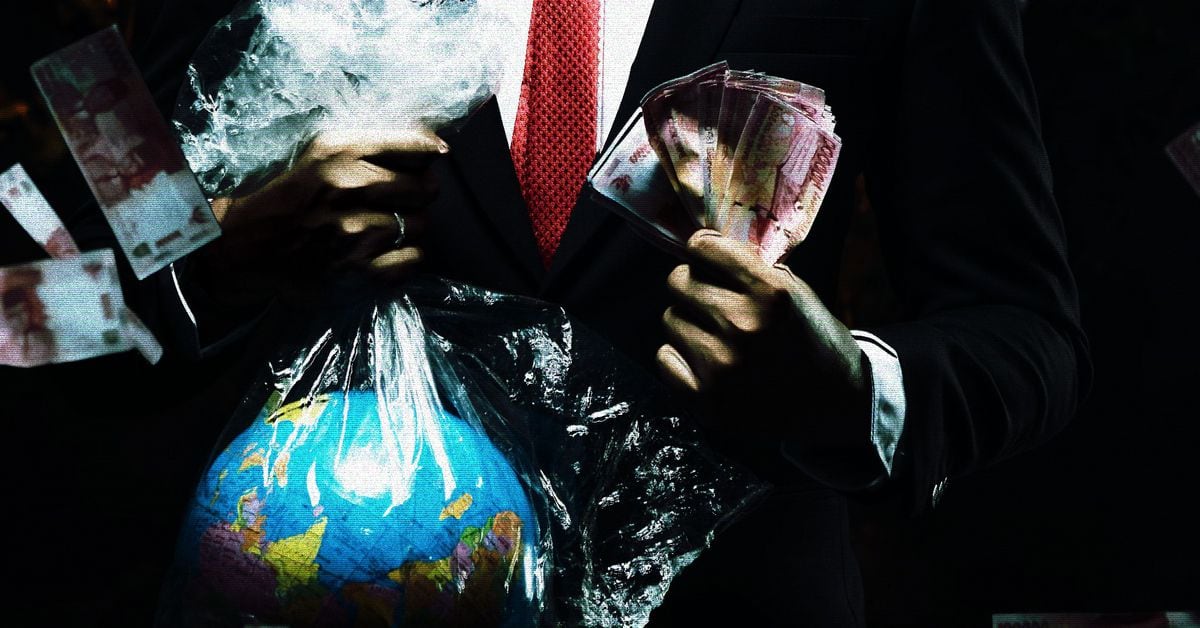Blockchain
Donald Trump’s Cryptocurrency Enthusiasm Is Just Another Scam

Former US President Donald Trump spoke at the Libertarian National Convention in May and lent his strong support to cryptocurrency: “I will also stop Joe Biden’s crusade to crush cryptocurrency. … I will ensure that the future of cryptocurrency and the future of bitcoin is made in the United States, not pushed abroad. I will support the right to self-custody. To the nation’s 50 million cryptocurrency holders, I say this: With your vote, I will keep Elizabeth Warren and her henchmen out of your bitcoin.”
Former US President Donald Trump spoke at the Libertarian National Convention in May and lent his strong support to cryptocurrency: “I will also stop Joe Biden’s crusade to crush cryptocurrency. … I will ensure that the future of cryptocurrency and the future of bitcoin is made in the United States, not pushed abroad. I will support the right to self-custody. To the nation’s 50 million cryptocurrency holders, I say this: With your vote, I will keep Elizabeth Warren and her henchmen out of your bitcoin.”
Trump continued to court the cryptocurrency industry in the months that followed; he appeared at the Bitcoin 2024 Conference in Nashville this week, alongside independent presidential candidate Robert F. Kennedy Jr. Trump’s parting words, “Have fun with your bitcoin and your crypto and everything else you’re playing with,” were less than enthusiastic, but the industry itself remains full of ardent Trump supporters.
This reversal came as a surprise, given Trump’s previous strong opposition to cryptocurrencies. When Facebook was launching its libra cryptocurrency in 2019, Trump tweeted: “I’m not a fan of Bitcoin and other cryptocurrencies, which are not money and whose value is highly volatile and based on nothing.” Former National Security Advisor John Bolton’s White House memoir, The Room Where It Happened, quotes Trump telling Treasury Secretary Steven Mnuchin: “Don’t be a trade negotiator. Go for Bitcoin [for fraud].” In 2021, Trump said Fox Business that bitcoin “just seems like a scam. … I want the dollar to be the world’s currency.”
Why the change? There doesn’t appear to be any cryptocurrency votes. Trump’s figure of “50 million” comes from a poorly sampled push poll from cryptocurrency exchange Coinbase which said 52 million cryptocurrency users in the United States starting in February 2023. But a survey A survey taken last October by the U.S. Federal Reserve showed that just 7 percent of adults (about 18.3 million people) admitted to holding or using cryptocurrency, down from 10 percent in 2022 and 12 percent in 2021. Many of these people are likely left high and dry bag holders after the 2022 cryptocurrency crash, and not necessarily fans anymore.
What Trump wants from the cryptocurrency industry is money. The cryptocurrency industry has so far raised more than 180 million dollars to support the 2024 U.S. elections through its super PACs Fairshake, Defend American Jobs, and Protect Progress.
Fairshake spent $10 million on pulling out Rep. Katie Porter in the primary battle for Dianne Feinstein’s California Senate seat, funding Porter’s pro-crypto rival, Adam Schiff. She put 2 million dollars to eliminate Rep. Jamaal Bowman in the Democratic primary for New York’s 16th District in favor of pro-crypto George Latimer. In Utah’s Republican Senate primary, Rep. John Curtis defeated Trent Staggs with the help of $4.7 million from Defend American Jobs. In Alabama’s House District 2, a majority of Campaign spending comes from the cryptocurrency sector.
Fairshake is substantially funded of Coinbase, cryptocurrency issuer Ripple Labs, and Silicon Valley venture capital firm Andreessen Horowitz, or a16z. Silicon Valley was awash in cryptocurrency during the 2021 bubble, and a16z in particular continues to to promote blockchain startup even now, and still holds a huge amount of crypto tokens from the bubble that it would like to be able to monetize.
Many in Silicon Valley would like an authoritarian who they believe will let them run free with their money, while bailing them out in times of trouble. In fact, Trump promised Bitcoin 2024 participants that he would keep all the bitcoins that the United States acquires. (Never mind that it is typically acquired as the proceeds of crime.) Silicon Valley explicitly sees regulation of any kind as its greatest enemy. Three a16z manifestos—the 2023 one “Politics and the future” AND “The Techno-Optimist Manifesto” and 2024 “The small technology program“—outlines co-founders Marc Andreessen and Ben Horowitz’s calls for a technology-fueled capitalism unhindered by regulation or social considerations. They name “experts,” “bureaucracy,” and “social responsibility” as their “enemies.” Their 2024 statement claims that banks are unfairly cutting startups out of the banking system; these would be cryptocurrency companies funded by a16z.
Trump’s choice for vice president, Senator J.D. Vance, is a former Silicon Valley venture capitalist. He was once employed by Peter Thiel, who bankrolled Vance’s successful run for Senate in 2022; Vance was described as a “Thiel creation”. He has increased support for the Trump ticket among his venture capital partners. Vance is a bitcoin holder and frequent supporter of cryptocurrencies. He recently circulated a bill to overhaul how the Securities and Exchange Commission (SEC) and the Commodity Futures Trading Commission (CFTC) oversee cryptocurrencies. In 2023, he circulated a bill to prevent banks from cut out cryptocurrency exchanges.
Minimal regulation has been tried before. It led to the wild exuberance of the 1920s, which culminated in the Black Tuesday Crash of 1929 and the Great Depression of the 1930s. Regulators like the SEC were put in place during that time to protect investors and transform the securities market from a jungle into a manicured garden, resulting in many decades of prosperity and stability.
Cryptocurrencies provide the opposite of a stable and functional system; it is a concrete example of how the lack of regulation allows opportunists and scammers to cause disasters on a large scale. The cryptocurrency crash of 2022 reproduced the 2008 financial crisis in miniature. FTX’s Sam Bankman-Fried was feted as a financial prodigy that would bring economic miracles if only I gave him carte blanche; he ended up stealing billions of dollars of customers’ money, destroyed the lives of ordinary people and is now in a prison cell.
U.S. regulators have long been concerned about the prospect of contagion from cryptocurrencies to the broader economy. Money laundering is endemic in cryptocurrencies; even the Trump administration has created rules in December 2020 to reduce the risk of cryptocurrency money laundering. Meanwhile, the cryptocurrency industry has been persistently trying to insinuate itself into systemically risky corners of the economy, such as pension funds.
Four US banks collapsed during the 2023 banking crisis, the first since 2020. Two of them, Silvergate Bank and Signature Bank, were deeply embedded in the cryptocurrency world: Silvergate in particular appears to have collapsed directly due to its heavy reliance on FTX and went bankrupt a few months later. Silicon Valley Bank was not interested in cryptocurrencies, but it collapsed from a run on the shore due to panic among holders of venture capitalist deposits, particularly Thiel’s Founders Fund.
Project 2025the Heritage Foundation colossus conservative wish list which Trump and Vance have at various times supported and sought to distance themselves from, emphasizes the importance of party loyalists, noting financial regulation in particular. The plan recommends replacing as much of the federal bureaucracy as possible with loyalists and “trusted” career officials rather than nonpartisan “experts.” Vance supported in 2021 that Trump should “fire every single mid-level bureaucrat, every civil servant in the administrative state” and “replace them with our people.” Loyalty is likely to triumph over competence.
Cryptocurrencies are barely mentioned directly in the 2025 Project, suggesting they have little active support among the broader conservative coalition. But toward the end of the manifesto is a plan to dismantle most U.S. financial regulations and investor protections put in place since the 1930s, suggesting the exemption the cryptocurrency industry wants from current SEC and CFTC regulations.
Bitcoin, the first cryptocurrency, started as an ideological project to promote a strange variant of Murray Rothbard’s anarcho-capitalism and the gold-backed Austrian economy we abandoned to escape the Great Depression. Crypto quickly co-opted the John Birch Society and Eustace Mullins “end of the Fed” and “institutional elite” conspiracy theories. It’s a way for billionaire capitalists like Thiel, Andreessen, and Elon Musk to claim they’re not part of the so-called elite.
If a second Trump administration stymies financial regulators and gives cryptocurrency free rein, it could further contribute to the collapse of the U.S. economy that Bitcoin claimed to have averted. But it’s more likely that Trump will be happy to take the cryptocurrency money and run.
Blockchain
Bitcoin (BTC) Price Crashes as Donald Trump’s Win Odds Dip

Markets received nominally good news on Thursday morning, with the US ISM manufacturing PMI for July falling much more than economists expected, sending interest rates to multi-month lows across the board. Additionally, initial jobless claims in the US jumped to their highest level in about a year. Taken together, the data adds to the sentiment that the US is on the verge of a cycle of monetary easing by the Federal Reserve, which is typically seen as bullish for risk assets, including bitcoin.
Blockchain
Terra Blockchain Reboots After Reentry Attack Leads to $4M Exploit

Please note that our Privacy Policy, terms of use, cookiesAND do not sell my personal information has been updated.
CoinDesk is a awarded press agency that deals with the cryptocurrency sector. Its journalists respect a rigorous set of editorial policiesIn November 2023, CoinDesk has been acquired from the Bullish group, owner of Bullisha regulated digital asset exchange. Bullish Group is majority owned by Block.one; both companies have interests in a variety of blockchain and digital asset businesses and significant digital asset holdings, including bitcoin. CoinDesk operates as an independent subsidiary with an editorial board to protect journalistic independence. CoinDesk employees, including journalists, are eligible to receive options in the Bullish group as part of their compensation.
Blockchain
$6.8M Stolen, ASTRO Collapses 60%

In the latest news in the blockchain industry, there has been a turn of events that has severely affected Terra and its users and investors, with the company losing $6.8 million. The attack, which exploited a reentry vulnerability in the network’s IBC hooks, raises questions about the security measures of the once celebrated blockchain protocol.
A web3 security company, Cyvers Alerts reported that the exploit occurred on July 31st and caused the company to lose 60 million ASTRO, 3.5 million USDC500,000 USDTand 2. 7 BitcoinThe flaw was discovered in April and allows cybercriminals to make payments non-stop by withdrawing money from the network.
Earth’s response
Subsequently, to the hack employed on the Terra blockchain, its official X platform declared the Suspension network operations for a few hours to apply the emergency measure. Finally in its sendTerra’s official account agreed, sharing that its operations are back online: the core transactions that make up the platform are now possible again.
However, the overall value of the various assets lost in the event was unclear.
Market Impact: ASTRO Crashes!
The hack had an immediate impact on the price of ASTRO, which dropped nearly 60% to $0.0206 following the network shutdown. This sharp decline highlights the vulnerability of token prices to security breaches and the resulting market volatility.
This incident is not the first time Terra has faced serious challenges. Earlier this year, the blockchain encountered significant problems that called into question its long-term viability. These repeated incidents underscore the need for stronger security measures to protect users’ assets and maintain trust in the network.
The recent Terra hack serves as a stark reminder of the ongoing security challenges in the blockchain space. As the platform works to regain stability, the broader crypto community will be watching closely.
Read also: Record Cryptocurrency Theft: Over $1 Billion Stolen in 2024
This is a major setback for Terra. How do you think this will impact the blockchain industry?
Blockchain
Luxembourg proposes updates to blockchain laws | Insights and resources

On July 24, 2024, the Ministry of Finance proposed Blockchain Bill IVwhich will provide greater flexibility and legal certainty for issuers using Distributed Ledger Technology (DLT). The bill will update three of Luxembourg’s financial laws, the Law of 6 April 2013 on dematerialised securitiesTHE Law of 5 April 1993 on the financial sector and the Law of 23 December 1998 establishing a financial sector supervisory commissionThis bill includes the additional option of a supervisory agent role and the inclusion of equity securities in dematerialized form.
DLT and Luxembourg
DLT is increasingly used in the financial and fund management sector in Luxembourg, offering numerous benefits and transforming various aspects of the industry.
Here are some examples:
- Digital Bonds: Luxembourg has seen multiple digital bond issuances via DLT. For example, the European Investment Bank has issued bonds that are registered, transferred and stored via DLT processes. These bonds are governed by Luxembourg law and registered on proprietary DLT platforms.
- Fund Administration: DLT can streamline fund administration processes, offering new opportunities and efficiencies for intermediaries, and can do the following:
- Automate capital calls and distributions using smart contracts,
- Simplify audits and ensure reporting accuracy through transparent and immutable transaction records.
- Warranty Management: Luxembourg-based DLT platforms allow clients to swap ownership of baskets of securities between different collateral pools at precise times.
- Tokenization: DLT is used to tokenize various assets, including real estate and luxury goods, by representing them in a tokenized and fractionalized format on the blockchain. This process can improve the liquidity and accessibility of traditionally illiquid assets.
- Tokenization of investment funds: DLT is being explored for the tokenization of investment funds, which can streamline the supply chain, reduce costs, and enable faster transactions. DLT can automate various elements of the supply chain, reducing the need for reconciliations between entities such as custodians, administrators, and investment managers.
- Issuance, settlement and payment platforms:Market participants are developing trusted networks using DLT technology to serve as a single source of shared truth among participants in financial instrument investment ecosystems.
- Legal framework: Luxembourg has adapted its legal framework to accommodate DLT, recognising the validity and enforceability of DLT-based financial instruments. This includes the following:
- Allow the use of DLT for the issuance of dematerialized securities,
- Recognize DLT for the circulation of securities,
- Enabling financial collateral arrangements on DLT financial instruments.
- Regulatory compliance: DLT can improve transparency in fund share ownership and regulatory compliance, providing fund managers with new opportunities for liquidity management and operational efficiency.
- Financial inclusion: By leveraging DLT, Luxembourg aims to promote greater financial inclusion and participation, potentially creating a more diverse and resilient financial system.
- Governance and ethics:The implementation of DLT can promote higher standards of governance and ethics, contributing to a more sustainable and responsible financial sector.
Luxembourg’s approach to DLT in finance and fund management is characterised by a principle of technology neutrality, recognising that innovative processes and technologies can contribute to improving financial services. This is exemplified by its commitment to creating a compatible legal and regulatory framework.
Short story
Luxembourg has already enacted three major blockchain-related laws, often referred to as Blockchain I, II and III.
Blockchain Law I (2019): This law, passed on March 1, 2019, was one of the first in the EU to recognize blockchain as equivalent to traditional transactions. It allowed the use of DLT for account registration, transfer, and materialization of securities.
Blockchain Law II (2021): Enacted on 22 January 2021, this law strengthened the Luxembourg legal framework on dematerialised securities. It recognised the possibility of using secure electronic registration mechanisms to issue such securities and expanded access for all credit institutions and investment firms.
Blockchain Act III (2023): Also known as Bill 8055, this is the most recent law in the blockchain field and was passed on March 14, 2023. This law has integrated the Luxembourg DLT framework in the following way:
- Update of the Act of 5 August 2005 on provisions relating to financial collateral to enable the use of electronic DLT as collateral on financial instruments registered in securities accounts,
- Implementation of EU Regulation 2022/858 on a pilot scheme for DLT-based market infrastructures (DLT Pilot Regulation),
- Redefining the notion of financial instruments in Law of 5 April 1993 on the financial sector and the Law of 30 May 2018 on financial instruments markets to align with the corresponding European regulations, including MiFID.
The Blockchain III Act strengthened the collateral rules for digital assets and aimed to increase legal certainty by allowing securities accounts on DLT to be pledged, while maintaining the efficient system of the 2005 Act on Financial Collateral Arrangements.
With the Blockchain IV bill, Luxembourg will build on the foundations laid by previous Blockchain laws and aims to consolidate Luxembourg’s position as a leading hub for financial innovation in Europe.
Blockchain Bill IV
The key provisions of the Blockchain IV bill include the following:
- Expanded scope: The bill expands the Luxembourg DLT legal framework to include equity securities in addition to debt securities. This expansion will allow the fund industry and transfer agents to use DLT to manage registers of shares and units, as well as to process fund shares.
- New role of the control agent: The bill introduces the role of a control agent as an alternative to the central account custodian for the issuance of dematerialised securities via DLT. This control agent can be an EU investment firm or a credit institution chosen by the issuer. This new role does not replace the current central account custodian, but, like all other roles, it must be notified to the Commission de Surveillance du Secteur Financier (CSSF), which is designated as the competent supervisory authority. The notification must be submitted two months after the control agent starts its activities.
- Responsibilities of the control agent: The control agent will manage the securities issuance account, verify the consistency between the securities issued and those registered on the DLT network, and supervise the chain of custody of the securities at the account holder and investor level.
- Simplified payment processesThe bill allows issuers to meet payment obligations under securities (such as interest, dividends or repayments) as soon as they have paid the relevant amounts to the paying agent, settlement agent or central account custodian.
- Simplified issuance and reconciliationThe bill simplifies the process of issuing, holding and reconciling dematerialized securities through DLT, eliminating the need for a central custodian to have a second level of custody and allowing securities to be credited directly to the accounts of investors or their delegates.
- Smart Contract Integration:The new processes can be executed using smart contracts with the assistance of the control agent, potentially increasing efficiency and reducing intermediation.
These changes are expected to bring several benefits to the Luxembourg financial sector, including:
- Fund Operations: Greater efficiency and reduced costs by leveraging DLT for the issuance and transfer of fund shares.
- Financial transactions: Greater transparency and security.
- Transparency of the regulatory environment: Increased attractiveness and competitiveness of the Luxembourg financial centre through greater legal clarity and flexibility for issuers and investors using DLT.
- Smart Contracts: Potential for automation of contractual terms, reduction of intermediaries and improvement of transaction traceability through smart contracts.
Blockchain Bill IV is part of Luxembourg’s ongoing strategy to develop a strong digital ecosystem as part of its economy and maintain its status as a leading hub for financial innovation. Luxembourg is positioning itself at the forefront of Europe’s growing digital financial landscape by constantly updating its regulatory framework.
Local regulations, such as Luxembourg law, complement European regulations by providing a more specific legal framework, adapted to local specificities. These local laws, together with European initiatives, aim to improve both the use and the security of projects involving new technologies. They help establish clear standards and promote consumer trust, while promoting innovation and ensuring better protection against potential risks associated with these emerging technologies. Check out our latest posts on these topics and, for more information on this law, blockchain technology and the tokenization mechanism, do not hesitate to contact us.
We are available to discuss any project related to digital finance, cryptocurrencies and disruptive technologies.
This informational piece, which may be considered advertising under the ethics rules of some jurisdictions, is provided with the understanding that it does not constitute the rendering of legal or other professional advice by Goodwin or its attorneys. Past results do not guarantee a similar outcome.
-

 Regulation11 months ago
Regulation11 months agoRipple CTO and Cardano founder clash over XRP’s regulatory challenges ⋆ ZyCrypto
-

 Regulation10 months ago
Regulation10 months agoNancy Pelosi Considers Supporting Republican Crypto Bill FIT21 – London Business News
-

 Videos11 months ago
Videos11 months agoCryptocurrency News: Bitcoin, ETH ETF, AI Crypto Rally, AKT, TON & MORE!!
-

 Regulation11 months ago
Regulation11 months agoBitcoin’s future is ‘bleak’ and ripe for regulation, says lead developer
-

 News8 months ago
News8 months agoAave Price Increases Following Whales Accumulation and V3.1 Launch
-

 Regulation8 months ago
Regulation8 months agoSouth Korea Imposes New ‘Monitoring’ Fees on Cryptocurrency Exchanges
-

 Regulation8 months ago
Regulation8 months agoA Blank Sheet for Cryptocurrencies: Kamala Harris’ Regulatory Opportunity
-

 Regulation8 months ago
Regulation8 months agoCryptocurrency Regulations in Slovenia 2024
-

 News11 months ago
News11 months agoThe trader earned $46 million with PEPE after reaching a new ATH
-

 Regulation10 months ago
Regulation10 months agoCrypto needs regulation to thrive: Tyler Cowen
-

 Blockchain11 months ago
Blockchain11 months agoSolana ranks the fastest blockchain in the world, surpassing Ethereum, Polygon ⋆ ZyCrypto
-

 Blockchain10 months ago
Blockchain10 months agoSolana Surpasses Ethereum and Polygon as the Fastest Blockchain ⋆ ZyCrypto





